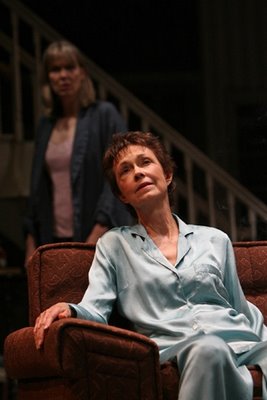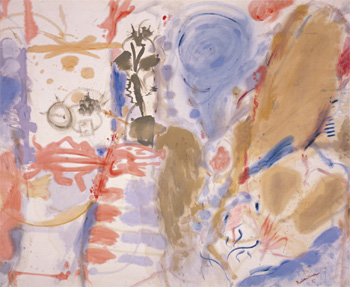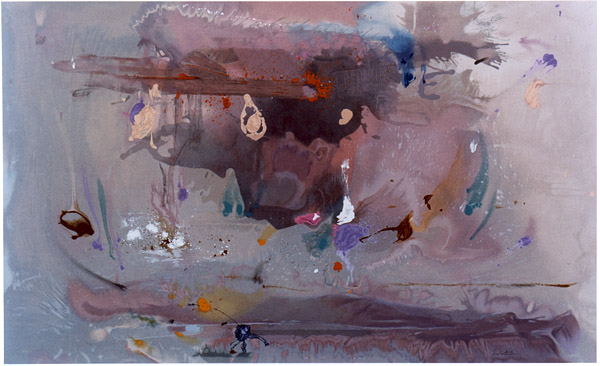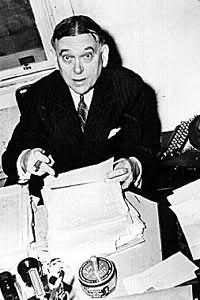This being an inescapably political week, I’m addressing a political topic–of sorts–in Saturday’s Wall Street Journal “Sightings” column.
My inspiration was a recent New York Times story called “Liberal Views Dominate Footlights” in which several American theater professionals were asked why the only political plays that get produced in this country are written from a liberal point of view. All replied that so far as they knew, conservatives don’t write plays. What struck me most forcibly about the story was its tacit assumption that anyone in his right mind would want to watch a “conservative” play that was the ideological inverse of the left-wing political plays to which my job requires me to subject myself from time to time.
I dropped that conceptual coin into my mental slot, and out came tomorrow’s “Sightings” column. Pick up a copy of the Saturday Journal and see what I have to say. It might surprise you.
UPDATE: Read the whole thing here.
Archives for November 2008
TT: Almanac
“Democracy is the fig leaf of elitism.”
Florence King, Reflections in a Jaundiced Eye
TT: So you want to see a show?
Here’s my list of recommended Broadway, off-Broadway, and out-of-town shows, updated weekly. In all cases, I gave these shows favorable reviews (if sometimes qualifiedly so) in The Wall Street Journal when they opened. For more information, click on the title.
Warning: Broadway shows marked with an asterisk were sold out, or nearly so, last week.
BROADWAY:
• Alfred Hitchcock’s The 39 Steps (comedy, G, suitable for bright children, reviewed here)
 • August: Osage County (drama, R, adult subject matter, reviewed here)
• August: Osage County (drama, R, adult subject matter, reviewed here)
• Avenue Q (musical, R, adult subject matter and one show-stopping scene of puppet-on-puppet sex, reviewed here)
• Boeing-Boeing (comedy, PG-13, cartoonishly sexy, reviewed here)
• Equus (drama, R, nudity and adult subject matter, closes Feb. 8, reviewed here)
• Gypsy (musical, PG-13, adult subject matter, reviewed here)
• The Little Mermaid (musical, G, entirely suitable for children, reviewed here)
• A Man for All Seasons (drama, G, too intellectually demanding for children of any age, closes Dec. 14, reviewed here)
• South Pacific * (musical, G/PG-13, some sexual content, brilliantly staged but unsuitable for viewers acutely allergic to preachiness, reviewed here)
OFF BROADWAY:
• The Fantasticks (musical, G, suitable for children capable of enjoying a love story, reviewed here)
IN SUBURBAN CHICAGO:
• Picnic (drama, PG-13, adult themes, closes Nov. 30, reviewed here)
CLOSING THIS WEEKEND IN CLEVELAND:
• Into the Woods and Macbeth (Sondheim musical/Shakespeare play, G/PG-13, performed in alternating repertory through Sunday, reviewed here)
TT: Almanac
“Democracy means government by the uneducated, while aristocracy means government by the badly educated.”
G.K. Chesterton (quoted in the New York Times, Feb. 1, 1931)
TT: Down the road
Last night I heard wild cheering and honking horns in the streets of the Upper West Side of New York City. For my part I found myself thinking not so much of the immediate moment as of the increasingly distant past. I was born in 1956 and grew up in a small town whose public schools were segregated well into the Sixties. My father witnessed a lynching in the streets of that same town a quarter-century earlier, one whose perpetrators were never brought to trial.
A few weeks ago I finished writing the biography of Louis Armstrong, who even at the height of his fame continued to be treated by some Americans not as the culture-changing genius that he was but as a menial–an inferior, if you will. Barrett Deems, who played in Armstrong’s band in the Fifties, spoke years later of one terrible episode that had burned itself into his memory:
The [road] manager and I were the only two white guys in the organization, and here’s Louis with five or ten grand in his pocket, his wife with a twenty thousand dollar mink coat, and they both had to sleep in a gymnasium in North Carolina because they couldn’t find any accommodations. That was a killer. It takes the heart out of a man.
Henry James said it: we shall never be again as we were.
TT: Eighty and counting
 I commend your attention to “Frankenthaler at 80: Six Decades,” which goes up at Knoedler & Company tomorrow and will be on view there through January 10. Here’s part of the press release:
I commend your attention to “Frankenthaler at 80: Six Decades,” which goes up at Knoedler & Company tomorrow and will be on view there through January 10. Here’s part of the press release:
Helen Frankenthaler, eminent among American abstract painters, will be eighty in December 2008. To celebrate her landmark birthday, Knoedler & Company is pleased to present this survey exhibition of major paintings spanning Frankenthaler’s entire career, from the 1950s to the 2000s. The show can be described as by, with, and from Frankenthaler. The selection has been made by the exhibition’s curator, Karen Wilkin, in consultation with the artist, from paintings that, until now, she has retained as part of her personal collection of her own work….
I got an advance peek at “Frankenthaler at 80” yesterday afternoon, and found it altogether remarkable. The show consists of nine works painted between 1957 and 2002, none of them small and one, “A Green Thought in a Green Shade,” very large. It isn’t easy to suggest Frankenthaler’s stylistic range in so compact an exhibition, but this one gets the job done with room to spare.
The accompanying catalogue, not at all surprisingly, is a superior piece of work. Karen Wilkin ranks very high on the short list of my favorite art critics, living or dead, and what she doesn’t know about Helen Frankenthaler probably isn’t so. Her essay makes a special point of praising Frankenthaler for her variety and unpredictability:
No matter what the mood, temperature, or even source of her paintings, she has never been a systematic explorer of material or formal possibilities. Unlike many of her colleagues, who habitually tested their ideas about chroma, interval, edge, and scale through intuition-driven themes and variations, she has never worked in series. There may be broad connections among groups of pictures made at about the same time, but each work has been “worried”–as Frankenthaler puts it–out of real experience….
We categorize Frankenthaler at our peril. Describe her as a master of radiant, uninhibited color relationships and she presents us with dark, brooding images, luminous monochromes, or pale, light-struck compositions devoid of chromatic color. Call her a radical innovator and we discover that, throughout her evolution, she has been engaged in a dialogue with the art of the past. Assign her to the ranks of uncompromising abstract painters and we notice that she is preternaturally attentive to the nuances of her surroundings, whether at home or abroad.
 It happens that Helen Frankenthaler is my favorite living painter, and the passage quoted above goes a long way toward explaining why, though I’d add one thing: she is one of the most enjoyable of the great American modernists, a painter who is unafraid to give pleasure and secure in the knowledge that to do so is a legitimate goal of modern art. Her work has been giving me intense and lasting pleasure ever since I started looking at paintings, and I’d surely write about this gorgeous show in The Wall Street Journal were I not the fortunate owner of one of her prints, “Grey Fireworks,” which hangs over the couch in my Upper West Side living room and of which Mrs. T and I are sinfully proud.
It happens that Helen Frankenthaler is my favorite living painter, and the passage quoted above goes a long way toward explaining why, though I’d add one thing: she is one of the most enjoyable of the great American modernists, a painter who is unafraid to give pleasure and secure in the knowledge that to do so is a legitimate goal of modern art. Her work has been giving me intense and lasting pleasure ever since I started looking at paintings, and I’d surely write about this gorgeous show in The Wall Street Journal were I not the fortunate owner of one of her prints, “Grey Fireworks,” which hangs over the couch in my Upper West Side living room and of which Mrs. T and I are sinfully proud.
Instead of holding forth at length about Frankenthaler’s virtues, I’ll simply urge you to go see “Frankenthaler at 80” for yourself. As for me, I can’t wait to see it again.
TT: Speaking of Mencken
 I ran across this Web page by chance when hunting down the original source of today’s almanac entry. It’s a complete listing of every time that H.L. Mencken is quoted in the second edition of the Oxford English Dictionary. The vast majority of the citations are usage-related excerpts from The American Language, but I did run across two Mencken quotes that had slipped my mind:
I ran across this Web page by chance when hunting down the original source of today’s almanac entry. It’s a complete listing of every time that H.L. Mencken is quoted in the second edition of the Oxford English Dictionary. The vast majority of the citations are usage-related excerpts from The American Language, but I did run across two Mencken quotes that had slipped my mind:
• “Why assume so glibly that the God who presumably created the universe is still running it?”
• “Is it hot in the rolling-mill? Are the hours long? Is $1.15 a day not enough? Then escape is very easy. Simply throw up your job, spit on your hands, and write another ‘Rosenkavalier’.”
Many more Mencken quotes can be found here. No matter what you thought of the election results, you’ll almost certainly find one that suits your tastes.
TT: Snapshot
UPA’s 1953 animated version of James Thurber’s “The Unicorn in the Garden,” with music by David Raksin:
(This is the latest in a weekly series of arts-related videos that appear in this space each Wednesday.)
